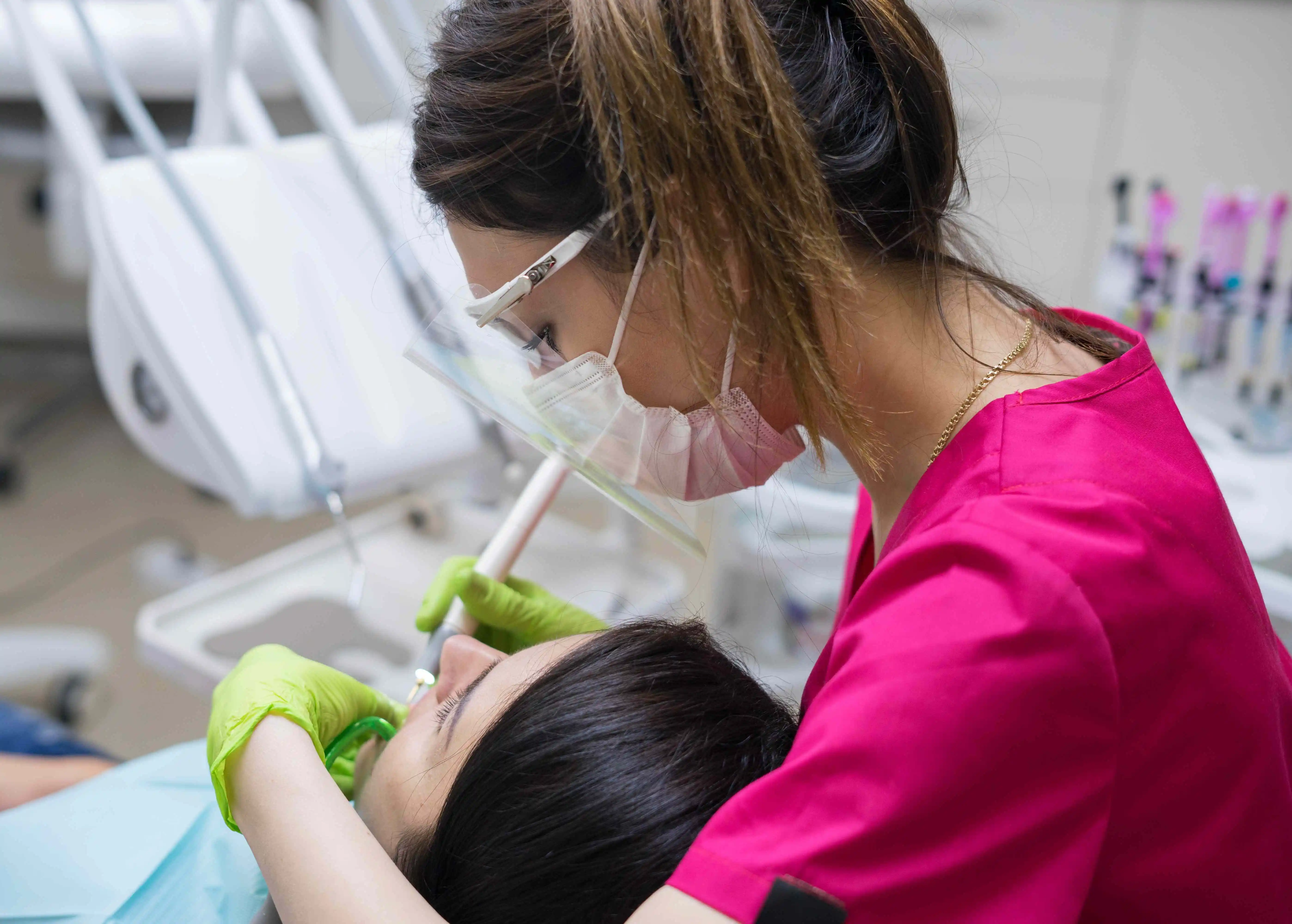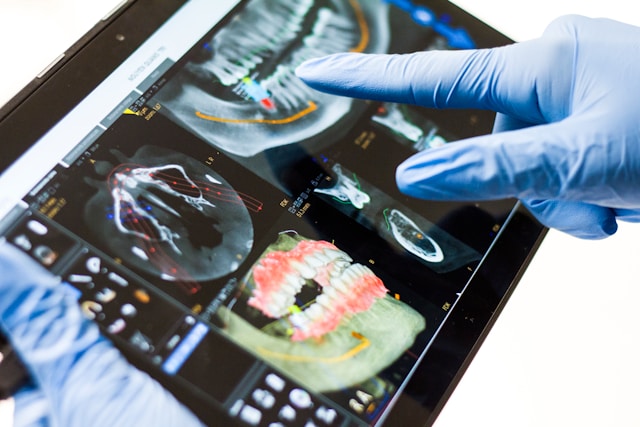Pediatric and general dentists address dental health conditions but differ significantly in several aspects. General dentists primarily focus on treating adult teeth and dental health issues.
In contrast, pediatric dentists specialize in treating children’s teeth, including baby teeth and mixed dentition (a combination of baby and adult teeth). Pediatric dentists may also provide dental care for adults with special needs.
We’ll discuss the distinctions between the two while talking about pediatric dentist vs. general dentist, exploring their education, scope of practice, and common procedures.
By gaining insight into these differences, you can decide which dentist you should visit for your child’s dental needs.
What is a Pediatric Dentist?

A pediatric dentist is a general dentist who has received specialized training, enhanced skills, and considerable experience in treating children. Pediatric dentists often spend an additional year in dental school after finishing the traditional four years of training.
During these extra two or three years, pediatric dentists learn particular abilities for treating all children, including those with special needs. As a result, pediatric dentists are well-equipped to treat the unique dental difficulties that children may have, offering comprehensive and specialized care.
What is a General Dentist?

A general dentist is a primary dental care professional who provides a wide range of dental operations, such as cavity treatments, bridge and crown fittings, and more. One of the direct benefits of seeing a general dentist is that they can provide dental care for the entire family.
General dentists provide comprehensive dental treatment, protecting the dental health of individuals and their families while providing them with the tools and information they need to practice basic oral hygiene.
Pediatric Dentist vs. General Dentist — Basic Differences
Education and Training
-
Pediatric Dentists
Pediatric dentists must complete a rigorous educational program that includes four years of undergraduate college study and four years of dental school. Furthermore, they devote at least two extra years solely to pediatric dentistry.
During these extra years, pediatric dentists study primary dentition (baby teeth), mixed dentition, child development, behavior, psychology, pharmacology, special needs patient care, and pediatric sedation.
They highly value effective communication tactics, such as using simplified language to ensure youngsters comprehend dental treatments and basic oral care. Furthermore, pediatric dentists usually treat patients up to the age of 18. However, they may also treat adults with special requirements.
-
General Dentists
General dentists, on the other hand, must complete four years of undergraduate college study and four years of dental school. Following that, they usually begin a one-year residency program (length varies by state). While general dentists do not have any additional training beyond dental school and residency, they are qualified to serve patients of all ages.
Equipment
-
Pediatric Dentists
Pediatric dentists provide an appealing and amusing environment to make youngsters feel more at ease during dental visits. They frequently include enjoyable aspects such as video games, televisions, and books to help distract youngsters from any potential fear they may have.
-
General Dentist
General dentists may only sometimes promote a kid-friendly setting because their core patient base consists of adults. As a result, their dental practice may have a different ambiance than pediatric dentistry practices.
Orthodontic Pre-Assessment
-
Pediatric Dentists
Orthodontic pre-assessment is often included in pediatric dentists’ complete examinations, and mild orthodontic procedures may be offered as appropriate.
-
General Dentist
In contrast, unless they can perform clear aligner therapy (please note that not all patients are acceptable candidates for this treatment), general dentists usually refer patients to an orthodontist for specialized orthodontic treatment.
Office Environment
-
Pediatric Dentists
Pediatric dentists use dental materials specifically made to fit in tiny mouths and navigate around baby teeth, ensuring maximum comfort and effectiveness throughout treatment.
-
General Dentist
In contrast, regular dentists may only sometimes supply pediatric dental tools, making operations more complex and potentially uncomfortable for the youngster.
Pediatric Dentist vs. General Dentist — Which is the Right Choice?
Choosing between pediatric dentist vs. general dentist is influenced by a number of things. A pediatric dentist may be the best option if your kid has specific dental difficulties or requires specialist care due to developmental conditions, behavioral challenges, or medical complexities.
They are equipped to handle such situations efficiently. Pediatric dentists also know about children’s dental health and growth, allowing them to give customized treatment regimens.
However, if your child does not have any special dental needs and you prefer a dentist who can meet the dental needs of your entire family, a general dentist may be a good choice. General dentists are trained to do routine check-ups, cleanings, and other common dental operations on people of all ages.
Finally, the decision between a pediatric dentist and a general dentist is based on your child’s individual dental needs, preferences, and the amount of expertise you seek. Before making this decision, it is critical to consider proximity, office hours, and your child’s comfort.
Regular dental check-ups and basic oral hygiene practices are vital for your child’s dental health, regardless of the sort of dentist you use. Developing pleasant and regular dental care habits early on lay the basis for a lifetime of healthy smiles.
When to Refer to a Pediatric Dentist
Choosing a pediatric dentist might help certain families reduce stress during dental visits. Pediatric dentists use unique approaches to make dental visits enjoyable for children. Choosing a pediatric dentist is advised if:
Your Child is Afraid of the Dentist
Pediatric dentistry clinics are generally built to be kid-friendly, with bright colors and toys for play. These aspects reduce anxiety and make the youngster feel more at peace.
Your Child Has Unique Requirements
A pediatric dentist has the expertise and experience to deliver a safe and accommodating dental appointment if your kid has problems such as autism, Down syndrome, or cleft palate.
A General Dentist May Refuse to Treat Extremely Young Children.
Some general dentists may need to be more qualified to treat very young children. In such instances, it is critical to seek the services of a pediatric dentist before your child turns one year old.
When to Refer to a General Dentist
Many families prefer a single dentist to care for their whole family. This method may be appropriate if:
You Have a Relation with a Certain Dentist
A long-standing relationship with a dentist contributes to familiarity and comfort for all family members during dental visits.
Your Family has Mostly Older Children
Tweens and teens have more patience and understanding than younger children. They are accustomed to dental visits and can adjust to various settings, making it easier to visit a general dentist.
Convenience is a Priority
If the ease of assembling the complete family at one dental location is vital to you, choosing a general dentist makes practical sense. It removes the need for several appointments and simplifies the dental care routine for the entire family.
Bottomline
Pediatric dentists specifically address children’s dental requirements, whereas general dentists treat adults’ dental needs. Pediatric dentists are specially trained to treat children and address their unique dental needs. They provide comprehensive care in a child-friendly setting.
General dentists treat the complete family’s dental needs but may need more specialized expertise for youngsters. Consider your child’s dental needs and preferences while deciding between pediatric dentist vs general dentist. Fill up the form and connect with the dentists of RiverRock DDS. You can also call us at 952.445.5556 or write to us at riverrockdds@gmail.com. We are located at 403 1st Ave, East Shakopee, MN 55379.







